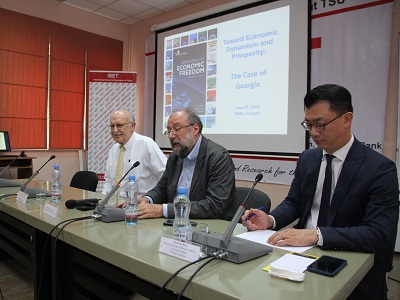That Georgia is making strident progress on a variety of international indices is widely reported in the domestic press, but many Georgians may still view claims of their country ranking highly on global lists of safety and economic freedom with a degree of skepticism; after all, the average wage remains low, and there are few opportunities outside of the capital.
It is, therefore, enlightening to hear exactly how Georgia is making progress first-hand from experts. On Friday June 28, representatives of the Heritage Foundation visited ISET to present the findings of the organization’s 2019 Index of Economic Freedom. The Heritage Foundation is an influential Washington-based think tank that came to prominence during the Reagan Administration of the 1980s, and remains one of the most influential research institutions in the United States. Along with its economic interests, the Foundation also reviews government policies and budgetary activities.
On the 2019 Index presented, Georgia was ranked ‘Mostly Free’, along with most of Europe; only two countries on the continent were ranked in the category above, ‘Free’, namely Switzerland and Ireland. However, most striking is the fact that Georgia is the only ‘Mostly Free’ country in the region: its neighbors (Russia, Turkey, Armenia, and Ukraine) were all ranked either ‘Moderately Free’ or ‘Mostly Unfree’.
On the overall rankings, out of 180, Georgia was placed 16th, a higher score than economic heavyweights such as Luxembourg, Sweden, and Finland. Ambassador Terry Miller, the Heritage Foundation’s Director of the Center of International Trade and Economics, explained the ‘Four Pillars’ of Economic Freedom: the Rule of Law, Government Size, Regulatory Efficiency, and Open Markets. Georgia was then compared to Azerbaijan, which was ranked as being only ‘Moderately Free’. Ambassador Miller explained that Azerbaijan does, in fact, have a larger economy than one would expect for a country ranked in this category, but this is due to its wealth from the Caspian Sea’s supplies of natural resources, and its freedom scores are considerably lower than those of Georgia.
Ambassador Miller then revealed the modern figures for Georgia and compared them with the numbers of the 1990s. Its economic freedom score increased by a staggering 32 points, and its GDP per capita rose from $578 to $4,290. In addition, inflation fell from 162% to just 4.7%, while Foreign Direct Investment rocketed from $242.5 million to $1.83 billion.
Georgians, therefore, should be optimistic for the future, as its economy continues to grow and its economic freedom remains high. The presentation was followed by a highly entertaining question and answer session led by Mr. Anthony Kim, the Heritage Foundation’s Research Manager and Editor. ISET would like to thank the Heritage Foundation representatives for taking the time to visit the institute, present the 2019 Index, and answer the audience’s questions. ISET is also grateful to Mamuka Tsereteli, Ph.D., Senior Fellow for Eurasia, American Foreign Policy Council/Central-Asia Caucasus Institute President, and Chair of America-Georgia Business Council, for moderating the discussion.











